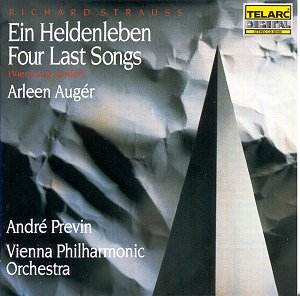There have been many glorious recordings
of Richard Strauss’s Four Last Songs, his final and possibly his most exquisite
celebration of the soprano voice, since their first performance by Kirsten
Flagstad at London’s Royal Albert Hall in May 1950. These have included
Janowitz, Jurinac, Schwarzkopf, Della Casa, Te Kanawa etc. This year
another sublime performance was committed to disc by Soile Isokoski
with the Berlin Radio Symphony Orchestra conducted by Marek Janowski
on Ondine ODE982-2, a recording that narrowly missed my critic’s 2002
choice short list. (Janowski’s accompaniment features ravishing horn
and fiddle solos in the ‘September’ and ‘Beim Schlafengehen’ songs respectively.)
This reissue enters an intensely competitive field.
Augér’s beautiful timbre, her silken,
seemingly effortless contouring of Strauss’s sinuous, sensual vocal
lines and her affecting expressive singing make this a most distinguished
reading, comparable with any of the performances identified above. Previn’s
accompaniment is sympathetic. (Augér’s untimely death in 1993 when she
was only in her early 50s was a tragic loss to music.)
Richard Strauss’s Ein
Heldenleben is not an easy work to bring off convincingly.
I can only remember one interpretation of its pompous, overblown personal
agenda that has persuaded me – well nearly – that of Celibidache with
the SWR Stuttgart Radio Symphony Orchestra in a boxed set of his recordings
of Richard Strauss works (DG 453 190-2).
Here Previn with the Vienna Philharmonic
is not quite so successful. There is swagger for the opening portrait
of the hero but Celibidache’s biting satire for the hero’s adversaries
is missing, the hero’s helpmate is not quite so capricious or beguiling
either. Previn’s battlefield is an exciting place and ultimately gloriously
victorious but again it lacks the depth and realistic perspectives of
the Stuttgart performance. Previn’s reading of the hero’s works of peace
movement is reasonably successful avoiding a tendency towards banality
that can trap less wary interpreters.
Augér beguiles in Richard Strauss’s Four Last Songs. Previn turns in a very satisfactory
reading of the flawed Ein Heldenleben.
Ian Lace and
Grace Lace

![]() Vienna Philharmonic Orchestra/André
Previn
Vienna Philharmonic Orchestra/André
Previn ![]() TELARC
CD-80180 [68:30]
TELARC
CD-80180 [68:30]